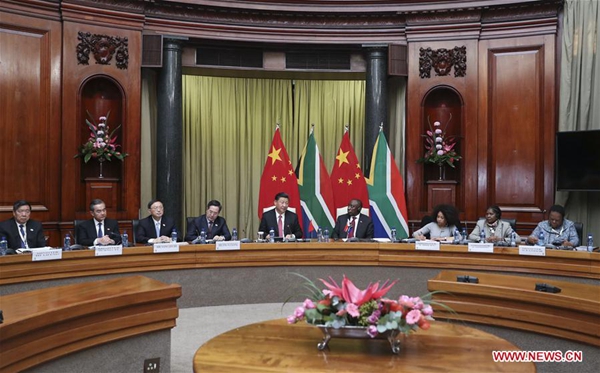China in the Persian Gulf and Africa
- By George N. Tzogopoulos
 0 Comment(s)
0 Comment(s) Print
Print E-mail China.org.cn, July 27, 2018
E-mail China.org.cn, July 27, 2018

The visit of Chinese President Xi Jinping to the United Arab Emirates (UAE), Senegal, Rwanda, South Africa and Mauritius is highlighting the scope of China's economic and diplomatic planning. The trip will not only help China further its international infrastructure and trade project known as the Belt and Road Initiative, but also establish closer bilateral ties and participate in multilateral forums.
Starting with the UAE, bilateral trade reached $52.65 billion last year according to state news agency WAM, with energy capturing the lion's share. China is interested in importing oil and natural gas from several Persian Gulf countries in order to cover its increasing needs and to diversify its import sources. The room for Chinese investment in UAE is significant. China's COSCO Shipping Ports Limited, for instance, has signed an agreement with Abu Dhabi Ports Company PJSC for the leasing of a container freight station. Moreover, relations between China and UAE have expanded into the financial sector, and the renminbi – China's currency – can be used in some transactions.
The role of Senegal is symbolic, as it was the first West African country to ink a Belt and Road deal with China, with the signing ceremony held just a few days ago. Chinese statistics show bilateral trade volume reached $21.9 billion in 2017. China is also providing aid and heavily investing in infrastructure in Senegal. The latter favorably looks at the former's liquidity to boost growth and improve living conditions for its citizens. Significant China-funded projects include the bridge of Foundiougne and the highway linking the cities Thies and Touba.
China is one of Rwanda's largest trading partners. As The EastAfrican newspaper reports, the bilateral trade volume registered $157 million in 2017, an increase of approximately 11 percent compared with 2016. This volume may further increase after Xi's recent visit – the first to Rwanda by a Chinese president – along with new investment in sectors such as energy and telecommunications. Among works already realized by China are the Amahoro National Stadium and the Masaka and Kibungo hospitals. In addition, China has played an important role in providing Rwandan students with scholarships and dispatching medical teams in times of crisis.
South Africa is perhaps the best-known country included in the president's trip. According to China, bilateral trade reached $39.17 billion in 2017, more than 20 times the figure when diplomatic relations were established in 1998. South Africa signed a memorandum of understanding on the Belt and Road Initiative in 2015, allowing for Chinese investments worth $14.7 billion to be carried out in the following years. The country is also endeavoring to attract Chinese investors for its special economic zones. Beyond the sphere of business and trade, China and South Africa collaborate at the international level, such as at G-20 summits of leading industrialized nations.
Symbolically, Mauritius is the only African country that lists the Chinese Spring Festival as a public holiday. According to the website of the Mauritian government, bilateral trade volume amounted to $880 million in 2017. More importantly, Mauritius is the first African country to start free trade negotiations with China, with the first round kicking off last April in Balaclava. If negotiations are successfully concluded, trade barriers on key products and services in finance, distribution, retail, insurance, education, law and accounting will be removed.
Xi is also visiting Africa to participate in the 10th annual BRICS summit of emerging economies in Johannesburg. Ten months after the last event in Xiamen, China is reiterating its position that the role of emerging markets and developing economies is gradually becoming larger. The visit is also seen as an opportunity to promote the summit of the Forum on China-Africa Cooperation that will be held in Beijing this October.
The visit of the Chinese president in the Persian Gulf and Africa is rich in results and substance. China is further strengthening existing friendships, and hopes to improve its public image across the globe.
George N. Tzogopoulos is a columnist with China.org.cn. For more information please visit:
http://www.china.org.cn/opinion/GeorgeNTzogopoulos.htm
Opinion articles reflect the views of their authors, not necessarily those of China.org.cn.






Go to Forum >>0 Comment(s)